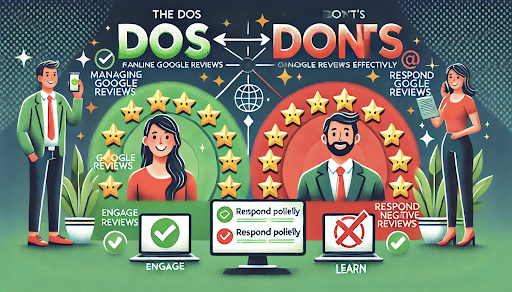
Consumers rely on feedback from others to guide their purchasing decisions, and the power of a positive or negative review cannot be underestimated. For businesses, managing online reviews effectively is crucial for building trust, increasing visibility, and improving customer satisfaction. However, handling reviews requires a careful balance of proactive engagement and measured responses.
This article explores the dos and don’ts of managing online reviews, helping businesses understand how to leverage feedback for their growth while avoiding common pitfalls.
The Dos of Managing Online Reviews
Engaging with your customers is one of the most critical steps in managing online reviews. Responding to reviews—whether they are positive or negative—demonstrates that you care about customer feedback and are committed to improving your services. Acknowledging positive reviews shows appreciation while addressing negative reviews presents an opportunity to resolve issues and show potential customers that you care about their experience.
When responding, maintain a professional and friendly tone, and ensure your responses are personalized to the reviewer’s experience. A well-crafted reply can turn a satisfied customer into a loyal advocate while handling complaints tactfully can often turn a dissatisfied customer into a returning one.
Do Encourage Customers to Leave Reviews
Positive reviews provide valuable social proof, which can influence future customers. While you should never pressure customers to leave a review, making it easy for them to do so can increase the number of reviews your business receives.
Providing links directly to your review pages or reminding customers immediately (like after a successful transaction or positive experience) can encourage more feedback. However, it’s important to note that while asking for reviews is appropriate, buying Google reviews or any other form of artificial review manipulation is unethical and a violation of Google’s policies. It’s crucial to gain organic feedback from real customers to maintain credibility and avoid penalties.
Do Monitor Your Online Presence Regularly
Keeping track of your online reviews should be a regular part of your business routine. Setting up Google Alerts or using online review management tools can help you stay on top of new reviews as they come in. By monitoring your online reputation, you can promptly respond to feedback, manage customer concerns, and take necessary actions to maintain your brand’s integrity.
Regular monitoring also helps you spot trends in customer feedback. If multiple reviews highlight the same issue, it could be a sign that you must improve a particular aspect of your business, such as product quality, customer service, or delivery times.
Do Use Reviews in Your Marketing Strategy
Positive reviews are a powerful marketing asset that can be used in various ways. By showcasing testimonials on your website or social media profiles, you highlight the satisfaction of your existing customers and build trust with potential customers. You can also use customer feedback in advertising campaigns, promotional emails, and newsletters.
For example, featuring a glowing review in an ad or social media post can help reinforce your business’s reputation and attract new customers. This type of social proof is one of the most effective ways to build credibility and influence buying decisions.
The Don’ts of Managing Online Reviews
Don’t Ignore Negative Reviews
Failing to respond to negative feedback can make your business appear unprofessional or uncaring. It also leaves potential customers with the impression that you don’t value their opinion.
Instead, take the opportunity to address negative reviews with professionalism and empathy. Apologize for any issues the customer experienced, offer solutions, and ask for a chance to rectify the situation. A thoughtful, respectful response can turn a negative experience into a positive one and demonstrate to potential customers that you take customer satisfaction seriously.
Don’t Engage in Arguments with Reviewers
It’s easy to get defensive when faced with a negative review, especially if you feel the feedback is unfair or inaccurate. However, arguments with reviewers will only harm your business’s reputation. Responding with anger or frustration can escalate the situation and reflect poorly on your business.
Instead, keep your responses calm, polite, and professional. Even if a customer’s complaint seems unreasonable, maintain a level of composure that reflects the values of your business. Remember, your response is not just for the reviewer—it’s also visible to others who may read the review in the future. How you handle negative feedback can impact your business’s image.
Don’t Offer Incentives for Reviews
Offering incentives for reviews may seem like a quick way to boost your ratings, but this practice can backfire. Google’s review policy prohibits businesses from offering discounts, free products, or other rewards in exchange for positive reviews. Such practices can lead to your reviews being flagged or removed, damaging your reputation with customers who value authenticity.
It’s essential to allow customers to leave reviews based on their genuine experiences. Trust and honesty are crucial components of a successful review strategy. Instead of offering incentives, focus on providing exceptional products and services that naturally inspire customers to share their feedback.
Don’t Overwhelm Customers with Review Requests
While encouraging reviews is essential, overwhelming your customers with constant requests can have the opposite effect. Bombarding customers with repeated messages asking for reviews can annoy them and may result in fewer reviews over time.
Instead, space out your review requests and only ask for feedback when it feels natural. For example, you might ask customers to leave a review after a purchase or after they’ve had time to experience your service. Timing is critical; asking for feedback at the right moment can yield better results.
Conclusion
Engaging with positive and negative feedback, using reviews to improve your offerings, and staying true to your brand’s values will lead to a more substantial, credible online reputation. While it may be tempting to buy Google reviews only way to truly build trust with customers is through honest, organic feedback. Authenticity is the key to turning online reviews into a powerful marketing tool that drives growth and success for your business.





Leave a Reply